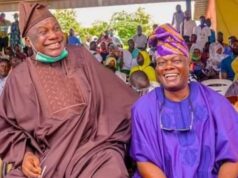
Governor Seyi Makinde likes to tell anyone who cares to listen how some of his influential friends opposed his decision to actively engage in politics. You are likely to know this uncomfortable truth if you subscribe to his newsletter. In the newsletter which is now in its 20th edition, the Governor walks readers through his reading list some of which have included but are not limited to Prosperity Paradox by Clayton M. Christensen et al, Robert Kiyosaki’s best-selling Rich Dad, Poor Dad, Stephen M.R. Covey’s The Speed of trust and as well recount the behind the scene story of his stewardship. Particularly, the governor takes exceptional concerns at the dearth of highly creative and adaptive leadership at the center – while clamoring for the devolution of power to the states for increased political and economic autonomy.
Additionally, the Newsletter offers a rich mix of incredible insight into some of the Governor’s rare and less reported parts: a compelling platform where his motivation and frustration, ideals and ideas, principles and perspectives are laid bare. Indeed, it’s quite possible to disagree with some of the Governor’s policies and political tactics; but you’re unlikely to dismiss most of his claims in the letter. Perhaps the newsletter will set you off on a tantalizing journey to discovering the authentic, original and true nature of the man who has held the state’s affairs for the past three years with a firm grip. For the most part, the Newsletter only captures the one-sided standpoint of the various works done by the Governor, sidestepping the necessary and critical part that also deserves mentioning. Thus the grave danger of taking the content of the newsletter hook, line, and sinker is its ability to turn you into one of the Governor’s fanatical lickspittle: a category of GSM admirers who believe criticism of the government and the Governor is borne out of envy, sheer hatred and outright malice.
Described in different monikers, Governor Makinde’s band of digital dingbats are almost everywhere throwing darts and daggers at anyone whose opinion diametrically opposes that of their principal. In fact, they are known to dismiss verifiable claims, impatient to engage in an intellectual dogfight, and are incontrovertibly averse to ideas that challenge their assumptions. For instance, when a section of Iseyin/Ibadan road came under heavy flooding last week, they were frantically quick to dismiss the news as the handiwork of the opposition and fake news purveyors. In effect, they promised fire and brim storm should pictures of the cracks turn out false. But when it was confirmed that a part of the N9.9billion road was indeed washed off, they went dead silent. What most supporters of Governor Makinde suffered from is what psychologists called binary bias: a basic human tendency to seek clarity and closure by simplifying a complex continuum into two categories. When people suffer from this bias, hearing an opposing opinion as Adam Grant captured it “doesn’t necessarily motivate them to rethink their stances”. Because to them, there’s nothing like an independent and objective analysis of issues; only when analysis favors them would they give credit to it. In a way, they simply discard arguments that punch them in the stomach as inconsequential. This kind of counterproductive attitude has also found its way into the heart of most of Makinde’s government policy thrust. The story is the same from education to infrastructure to recruitment to appointments.
Given the way some of Governor Makinde’s policy thrusts have somersaulted and turned upside down, it helps to draw from experts to shed light on where shoes began to pinch the administration. In their truly riveting book, Leadership on the Line (a book I am recommending for the Governor), Ronald Heifetz and Marty Linsky contended that “profound change is more honest than grandiose, more incremental than the experience of it, and builds from the enduring values of individual human communities and the orienting values of the human communities”. Take education. Life has never been tougher for virtually all public schools in the state under this administration. As the findings show, school children now provide answer scripts for themselves during examinations. This has gone on for the umpteenth time with no remedy in sight!
In one of his interventions on the blatant decision of Governor Makinde’s administration to scrap the imposed N3,000 level on students across the state, famed columnist, Dr. Festus Adedayo penned a critically acclaimed piece opposing the flagrant disregard for data, science, and logic in that hasten pronouncement. “I was very upset with the new governor at the pronouncement (the piece was written on the 10th of June, 2019, a few weeks after inauguration), “not strictly on the pedestal of ideology” Dr. Festus fired “I felt Makinde was only playing to the gallery”. Why would a governor stop the payment of a meager fee of #3,000, payable by parents and guardians in 365 days, approximating a little less than a hundred naira per day, an amount that has helped, no matter how insignificantly, in putting public education at whatever level it is in the state? Instead of backtracking after the policy fired back, as usual, the government moved on with mirthful recklessness.
After being captured by the political class, the Nigerian Union of Teachers seems off the struggle radar. It’s utterly embarrassing how such a vibrant association of noble professionals is now a shadow of itself. Once salary is promptly paid as it is under this government, it appears teachers no longer have the courage and audacity to call for proper funding of education again. In a sense, those who are supposed to be at the vanguard of this agitation are now in the backseat of it. The fear of Dr. Festus and a host of others concerning the cosmetic approach to education have only aggravated. The eyesore is before everyone. The intention to lift more than 400,000 out-of-the-school children from the street back to the classrooms seems defeated. Those who were supposed to be helped by the free education policy are the ones now left behind. The quality education that was the hallmark of the government has now turned to shamble. Schools are now worse off than they were in the days of the imposed levy.
This same pattern of cosmetic approach to deeply entrenched social malaise has also found its way into the heart of other policy thrusts and programs. Take the N28 billion Light Up Oyo project. After the project was deemed unsustainable partly because of diesel price fluctuation and the obvious setback that may arise from lack of its continuity, the state government in one of its rare moments of backtracking decided to re-power the street lights with gas. Still, renewable energy remains the future of electrification. That this government could rethink some of its stances regardless of the backlash shows that the continuous engagement of the system is an irrefutable way to achieving the state of our dream. Psychologists find that admitting we were wrong doesn’t make us look less competent. It’s a display of honesty and willingness to learn. As Ronald Heifetz and Marty Linsky thoughtfully observed “the challenges of the twenty-first century need not a single savior, but everyday leadership from people mobilizing collective creativity on tough problems within their reach from wherever they live”.
OYO101 is Muftau Gbadegesin’s Opinion about Issues affecting Oyo state, published on Saturdays. He can be reached via @TheGMAKing on Twitter, muftaugbadegesin@gmail.com and 09065176850











